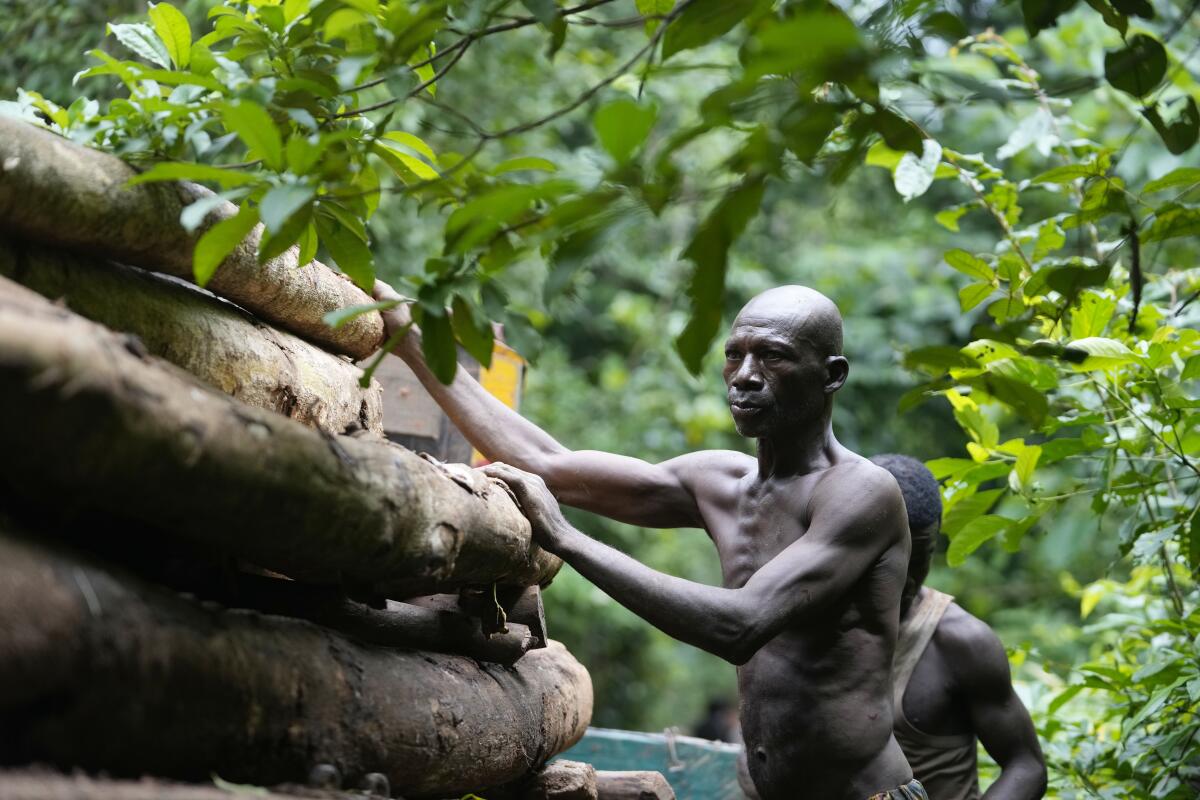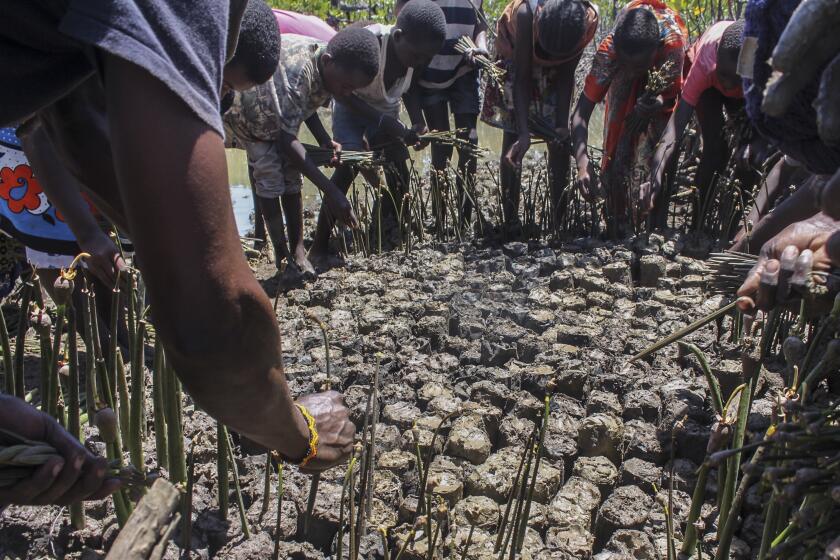Logging is growing in a Nigerian forest home to endangered elephants

- Share via
OMO FOREST RESERVE, Nigeria — Roaring chain saws sent trees crashing to the ground, and bare-chested men hacked away at the branches beside a muddy road. Others heaved logs onto a truck, where they were tied in place with wire.
The work was similar on the other side of the road, with a timber-laden truck coughing dark plumes of smoke as it pulled away. This was miles into the conservation zone of Omo Forest Reserve in southern Nigeria, a protected area where logging is prohibited because it’s home to threatened species like African elephants, pangolins and white-throated monkeys. But forest rangers, seeing the impunity, were hesitant to act.
“We see people we arrested and turned over to the government back in the forest, and they get emboldened,” ranger Sunday Abiodun told the Associated Press during a recent trip to the reserve.
Conservationists say the outer region of Omo Forest Reserve, where logging is allowed, is already heavily deforested. As trees become scarce, loggers are heading deep into the 212-square-mile conservation area, which is also under threat from uncontrolled cocoa farming and poaching.
Deforestation rates have accelerated over the last decade, raising fears that the Congo Basin could one day suffer the fate of the Amazon.
Conservationists and rangers blame the government for not enforcing environmental regulations or adequately replanting trees, impeding Nigeria’s pledge under the Paris climate agreement to maintain places like forests that absorb carbon from the atmosphere.
The government of Nigeria’s southwestern Ogun state, which owns the reserve, denied failing to enforce regulations. In a statement, it said it’s replanting more trees than are being cut down.
The forest’s gatekeepers and those processing the wood both dispute that assertion, insisting trees are disappearing.
Sawmillers get annual permits from the government to cut down trees until their designated area is completely deforested. Then they can apply for a new section. They say the permit fee of 2 million naira ($2,645) is intended to cover the government’s costs to replace trees but that this rarely occurs.
“The government is not replanting,” said Owolabi Oguntimehin, a sawmiller in Ijebu, a nearby town that has more than 50 sawmilling companies relying on the reserve. “It is not our responsibility to replant because the government collects the fee from us.”
A new law aims at sharing proceeds from forest concessions with affected communities, but some may not be savvy enough to benefit.
Besides problems with replanting, authorities don’t enforce tree removal standards, even when loggers get permits, according to forest guards, who are employed by the state government.
Joseph Olaonipekun, a guard, said officials from Ogun state’s forestry department used to mark trees that could be cut and ensure “strict” enforcement to prevent others from being removed. But that’s no longer done, he said.
“By implementing selective logging, the adverse effects on the biodiversity of an area can be minimized while also providing the opportunity for young trees to continue growing,” Nigerian ecologist Babajide Agboola said. “This method allows for a more sustainable approach to logging and forest management.”
Trees such as Cordia wood, mahogany and gmelina are disappearing from the forest’s periphery, according to both sawmillers and reserve gatekeepers.
“There has to be massive reforestation so that the conservation zone will not be dismantled,” Agboola said.
Africa looks to vast forests for carbon credits
But forest rangers hired by the nonprofit Nigerian Conservation Foundation, which is the government’s partner in managing the conservation zone, have found it a challenge to protect against illegal logging in off-limits areas.
They say loggers harvesting trees in the conservation zone brag about bypassing regulations by paying off government officials.
“We want the government to support us in preserving the forest,” ranger Johnson Adejayin said. He echoed his colleagues in calling for strict enforcement and sanctions, “so that the loggers do not come back to continue their illegal acts and boast that with money they can avoid punishment.”
The Nigerian economy, Africa’s largest, heavily relies on agriculture, forestry and other land uses. These industries, which are responsible for 25% of Nigeria’s greenhouse gas emissions, provide jobs for the majority of people in agrarian communities around the reserve.
As a result, there is debate about the political will to enforce environmental sustainability when livelihoods are at stake.
That factor should be considered, said Wale Adedayo, chairman of the Ijebu East local government area where a significant part of the forest is located. He advocated for a reduction of the conservation zone to give more land to locals to farm and log.
In a bid to protect coastal communities from climate change and encourage investment, African nations are turning to mangrove restoration projects.
But he also acknowledged that “there is a lot of deforestation” that should be reversed to ensure Nigeria’s contribution to fighting climate change.
For its part, the state government said “it is incorrect” to blame the pressure to make a living “when loggers illegally find their way into the conservation area to steal parts of the conserved trees.”
Adedayo said logging in protected areas “is not possible without the connivance of the civil servants.”
The government’s forest guards have seen it firsthand.
“There is too much corruption in this forest caused by greed and poverty,” Olaonipekun said. “When we say, ‘Don’t go there,’ some go through higher authorities to defy us, and we are helpless.”
The government, meanwhile, has delayed formally declaring the conservation area a wildlife sanctuary to protect it from threats like logging, farming and poaching, said Emmanuel Olabode, who manages the Nigerian Conservation Foundation’s wildlife conservation project in the forest.
Logging in the tropical forests of West Africa may be causing devastating wars among the chimpanzees there, concludes a scientist who has studied the animals for eight years.
The foundation’s rangers are focused on nearly 6.5 square kilometers of strictly protected land where elephants are believed to live and has been designated a Biosphere Reserve by UNESCO.
“It is left to the government to enforce the regulations,” said Olabode, who supervises the foundation’s rangers.
Loggers even have resorted to violence to ensure their timber supply. Olabode recounted when assailants with assault rifles attacked a rangers’ patrol base in 2021, and loggers just kept cutting trees.
“Our rangers escaped with injuries, and we notified the authorities, but nothing was done, and we have not gone back there due to security concerns,” Olabode said, adding that the area is now unprotected.
The government says it plans to employ the military and police to combat illegal operators. It urges loggers who follow the rules to “fight their members who are into illegalities.”
More to Read
Sign up for Essential California
The most important California stories and recommendations in your inbox every morning.
You may occasionally receive promotional content from the Los Angeles Times.














